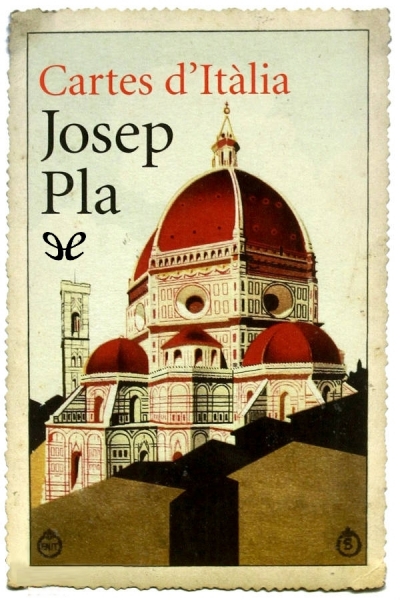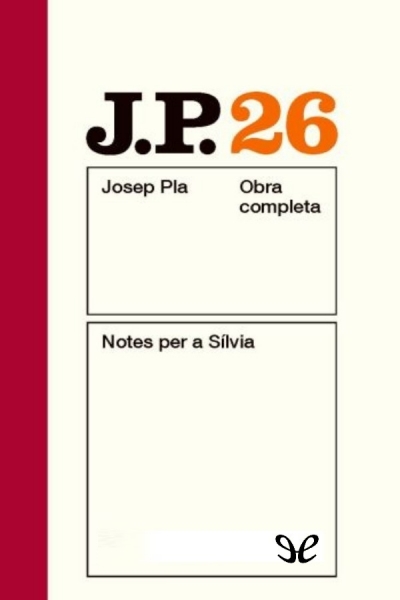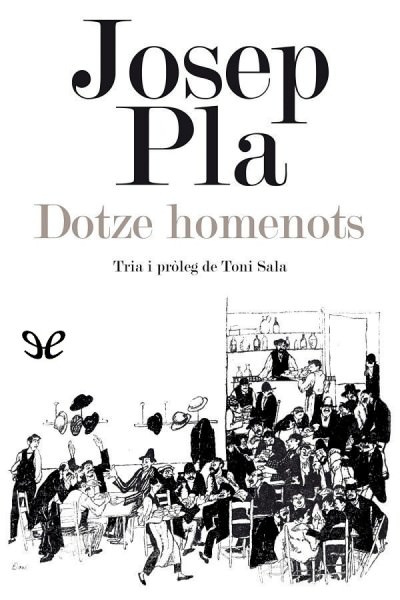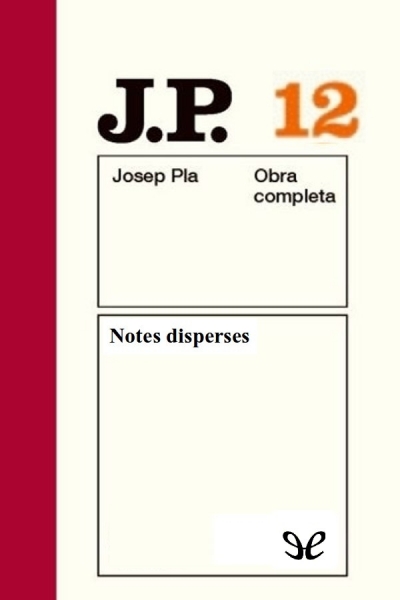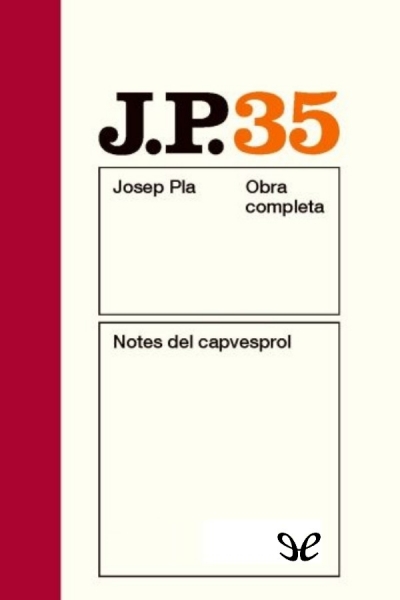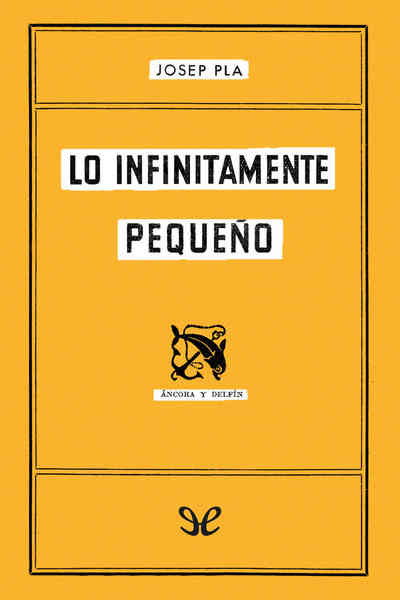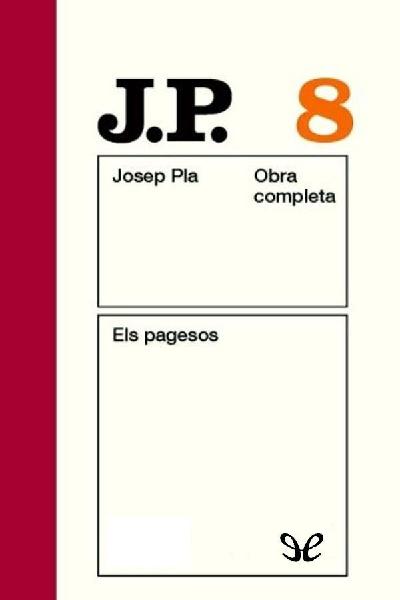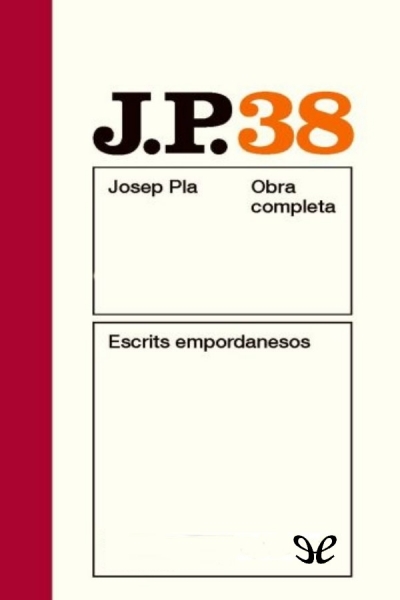oleebook.com
La vida amarga de Josep Pla
de Josep Pla - Género: Comunicación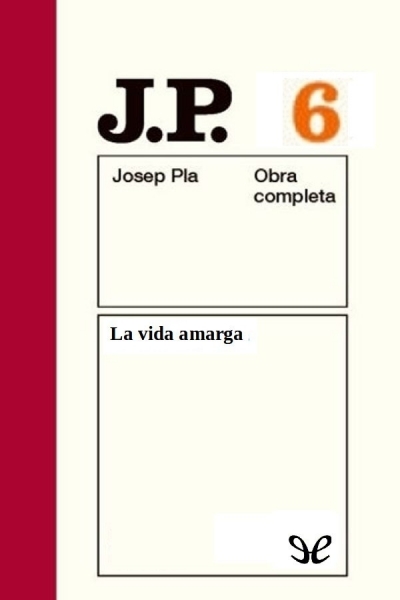
Sinopsis
La vida amarga recull les narracions en què, als primers anys 20, Josep Pla va fixar les seves experiències de jove periodista que viatja per Europa i que com va dir ell mateix ha arribat «a tastar moltes cuines, a dormir en innombrables llits, a parlar amb molta gent». Les seves històries porten el lector de Barcelona a Madrid i, després, a diversos escenaris de França, Anglaterra, Portugal, Itàlia i Alemanya; i sempre lacaren a un món vivíssim, observat amb una atenció minuciosa a les persones que shi mouen. En la seva forma definitiva, La vida amarga va aparèixer el 1966 com a volum sisè de lObra completa; Pla hi va anteposar un prefaci en el qual confessa: «La literatura narrativa és la literatura que mhauria agradat de cultivar si no mhagués dedicat al periodisme, és a dir, si la dispersió angoixant del periodisme mho hagués permès». En efecte: a més dun extraordinari escriptor de llibres de memòries, dassaig o de viatges, Pla va ser, també, un magnífic narrador. Aquest aspecte de la seva tasca literària es reflecteix en algunes novel·les, com El carrer Estret, i en diversos passatges de llibres majors; però brilla sobretot en els vint-i-quatre relats de La vida amarga, que retraten amb mà mestra el periple del jove Pla per lEuropa dentreguerres.
Descargar
Descargar La vida amarga ePub GratisLibros Recomendados - Relacionados
Reseñas Varias sobre este libro
LIFE EMBITTERS (1967), written by Josep Pla, may be described as a collection of anecdotes, mostly autobiographical, written when he was a young man. Pla was a controversial Catalan writer known for his fascist sympathies, but these do not make an appearance in this book. He was immensely prolific, he has an impressive reputation and apparently he was hugely influential. I really looked forward to reading this book, but I was rather disappointed with it. I found it really hard to finish it.
Pla travels around Europe and meets people, mainly in boarding houses. Many of his stories take place in seedy Spanish boarding houses, some take place in France, others in Germany. Most of his characters are male, unfortunate eccentrics whose frailties are exposed with subtle humor, a gentle, mocking humor which I personally found distasteful because the objects of his mockery were downtrodden people, people who had known a better life and had lost everything, men and women with embittered lives who barely managed to scrape a living.
Pla is a very good observer and he has a great ear for dialogue. He manages to capture the melancholy landscape of a Europe steeped in depression before the war with great clarity. And yet, I felt something was lacking in his narrator. He always keeps his distance and seems to hide behind his wit. Most distressing of all, for me, was one of the last stories: a tragic story of a crippled boy and the narrator's failure to act. I was thankful that the book was almost finished.
I wouldn't to discourage readers from trying Pla's writing. It's probably my fault and my lack of sensitivity to his charms which make me rate this book with only 3 stars.archipelago-books historical-fiction short-stories ...more6 s Bernal Diaz7 Read
The name of Catalan Josep Pla drew a lip curl from my Catalan friend followed by grudging acknowledgement of his status as distinguished author. The lip curl was for Plas politics.
When General Franco made war on his own government, Pla took the side of the rebel fascists. For that, republicans threatened to kill him and he escaped the country in company with his fiance a spy for Franco. He returned when the civil war had all but been won, only to find that the dictatorship he had supported banned his native language and censored his work.
Hence, even today, Pla has an ambivalent status not un that of the Norwegian Knut Hamsun, whose novel Hunger I have also reviewed. Fêted as among Spains greatest modern writers, Pla has also at times been neglected due to distaste for his fascist sympathies.
These do not make any conspicuous appearance in Life Embitters, on the contrary, Pla writes of the mendacious harangues and lunatic fanaticism of the Florentine branch of Mussolinis Fascio di Combattimento. But this is only in passing. For an author whose life provoked political controversy, his book is remarkably free of it. Its an open question in what measure that may be due to artistic choice or to Francos censors.
Pla is one of those, he says in his preface, who feel vague, insubstantial shadows hovering briefly over this earth; Im a complete unknown as a person. If one supposes I have any human, literary, or other pretensions something hard for me to confirm; my work is reminiscences of the ashes of life.
These observations and the title! are liable to make us fear the book itself will be melancholic and miserable. The effect, for me, is more one of distance, though that does perhaps suggest a depressive stance. The text, written when Pla was young, revised for publication when he was old, seems a precursor of the oeuvre of Geoff Dyer, falling somewhere between short fiction, travel writing and autobiography. But autobiography with little of the author in it.
Pla appears implicitly as the narrator of each piece, and is occasionally named as such. His journalistic eye observes characters, colourful incidents, towns and landscapes. But there is not much in the way of character arc or dramatic resolution. We see his judgements; rarely his actions. And on two of the few occasions in which he becomes an actor in one of his stories two of the most affecting in the collection the decisive moment is his failure to act.
In one of these, Roby or Deflation, the narrators brother admonishes him for the rootless existence that allows telegrams accurately addressed to his boarding house to be returned with the words not known. The narrator, worrying about his apparent anonymity, bumps into the other lodger of the house, who drunkenly reels off the shameful anecdote of his failure to intervene in the beating of Roby, the lame and neglected child of the establishment.
Our narrator is disgusted but soon finds himself in the same position, a hand on the handle of the door to his landladys rooms: something had smashed against the wall probably the boys head I dont remember how long I stayed that by the door, full of indignation and pity. The reader is no more spared than the boy: there is no heroic rescue. The boy runs bleeding from the house and the narrator shadows him, wanting to watch over and protect him, yet unwilling to break from the shadows and make human contact. In the end the narrator remains unknown.
To have the protagonist recapitulate the failure of a minor character is a bold move and Deflation is an accurate title. I find the story moving and human, if downbeat. This is the sort of life that embitters. But I said that the book is distant, austere, rather than miserable, and am not so far proving my point.
Afflicted by the hyperinflation of 1920s Berlin, Plas friend and colleague Eugeni Xammar enlists him in a resistance movement to the fantastic accumulation of ersatz products churned out cheaply by the new factories at the birth of the consumer age: We must create a lobby and oppose attempts made by any form of margarine to infiltrate our bodies.
To maintain a fresh and full-fat diet, leaving the novelty of canned goods on the shelf, the pair cultivate their credit-worthiness by purchasing a dog: When you go shopping, the shop assistant will say: You, sir, are the man who owns that dog, that fantastic dog And they will give you a fetching smile. You have become that gentleman who has that dog.
Here Ive jumped straight over austerity, going from misery to humour. Plas austere tone is perhaps best represented in a tale that may at first seem among his most whimsical. The sight of a penguin eating a sparrow leads to A Conversation in St Jamess Park, a conversation which eschews the sentimentality of fantastic explanations of why humanity suffers so on the basis that God does not punish sparrows. Sparrows are simply eaten. In manner, Pla implies, the incidents of our human lives are neither punishment nor reward.
This rejection of a hidden order is as close as Pla gets in this book to postulating a worldview. He prefers to report what he has witnessed, ever the good journalist, and leave the rest to us. He obsesses over description, unafraid of the adjective (un many contemporary authors). Here he is on Flanders:
The country is as flat as a hand; blue down, a barely perceptible veil of darkness sheaths the fields infinite shades of apple green Tall slender trees stand to attention along the canals, shadows from their unstill leaves tremble over the water. Changing and ineffable, the wondrous gray-green sky quivers and frolics, voluptuous yet melancholy in the dense, sleeping water A barge daubed with tar leaves a hazy trail of light The sun hides behind a creamy pink cloud, a stray beam strikes a distant purple downpour and that vaguely opaque eyelid covers the earth once again and shrouds the glittering waters.
Its lovely stuff, though I feel the mania for accuracy has diminishing returns, given much depends on the imagination of the reader. At least, I struggle when this forensic level of description is applied to people:
His forehead was rather narrow and depressed, his large ears stuck out, his bulging bloodshot eyes floated in yellowish lymph, his mustache was a handlebar, his jaw slightly jutted, his skin was pallid though his mouth and nose were normal jarring with the general makeup of his face and thus peculiar, his legs were bandy brackets.
For me this creates an optical illusion, if thats the right phrase for something one sees in the minds eye. No doubt Pla carefully observed real physiognomies, and his characters, fictional or not, are as life as the anatomical sketches of Old Masters. But I normally dont study peoples features so intently.
Theres not much to notice in ones mouth bear with me here until something changes. When a tooth is removed then, though the vanished molar was a normal size, the gap it leaves seems ENORMOUS and the tongue cant ignore it. In much the same way, as Pla draws my attention to each of these individual details of a whole face or person, they swell larger than life, Im looking at them in a circus mirror.
By the end of the book, despite having been shown many quirks of human nature, many people and places, many slices of life convincing in their blunders and abruptness, I felt that Id seen them largely from the outside looking in. Perhaps that distance is Plas intended affect, the cool irony that embitters life.
You can read this review on my blog: http://viewsrebooks.info/sparrows-are... Elaine Aldred285 6
This book of short stories explores the type of world you can sense exists beyond the main body of a novel, but one that the novel does not have the time or space to linger over. The stories are intimate windows into the lives of a wide variety of people, with Europe as a canvas. The intricate interactions between each of the protagonists form the backbone of the many narratives. The dense description in each episode creates a real sense of immersion, which makes Life Embitters the type book that begs to be delved into repeatedly, because with each read new details emerge. It is the details that make it possible for Pla to carry off understated humour within what might be a very serious subject such as death, or simply enjoy the extensive cast of sometimes extraordinary characters. It is also the details that will not only resonate with the reader but of which they will never tire. The book is also a fascinating insight into life in Europe in the early twentieth century.2 s Brandon67 8
the inverse or antidote to that Noseguard (sic) guys egomania and self-obsession, Pla crafts a remarkable and lived-in tapestry of life with his narratives. I agree to call them narratives because they are diverse in style, length, and tone, but are all immersive accounts of life often funny and sad and all that the title implies. It doesnt appear easy to know where to start with Pla, so Ill probably read the NYBR volume The Gray Notebooks listed as number one in this series next, then pick up Salt Water.favorites Timothy Frasca249 Read
Very quirky and seductive. In a lot of the stories, not much happens, but you're pulled along anyway with the observations and comments. Gives a good sense of the interwar years among a certain bohemian, starving-artist set. Many of the tales are set in boarding houses. rae20 4 Read
another substitution for a long fic i read. i do not feel ashamed Chris576 13 Read
This hefty tome is a collection of short (20-30pp.) stories of life in European cities in the 1920s. There is not much drama in the stories but beautiful, elaborate, well-translated descriptions of cities London, Lisbon, Barcelona and Berlin. Though Pla's eye is critical and his description of the people he encounters, harsh, the title alludes to a harshness I didn't experience reading.
I thought Pla's descriptions of women sometimes were unfair or simply, too easily reflected the bias toward women at the time. There were one or two times, I had to reread a sentence and wasn't sure if it was the typesetting or the translation that confused me, but in 600pages that's not a bad percentage.
I found Pla's writing and exacting descriptions inspiring. I could see traveling Europe with only this book to read on trains and in cafés. patty587 10
Excellent translation. I look forward to the next Pla book published in English. A fascinating insight into life in Europe in the early decades of the twentieth century. Pla travels through Portugal, Spain, France, Italy, and Germany, living as a "subtenant," sharing meals and cafe time with fellow subtenants, business associates, and others he meets along the way, and writes beautifully about his experiences -- both about the locations and the people.
Here's a link to a review if you are interested in more details: http://www.rochester.edu/College/tran...memoir-bio read-2016 spain Jeff BurseyAuthor 14 books178
Three and a half stars, really, occasionally rising to four. More on this later.
It's later, and here is a long review:
http://quarterlyconversation.com/life... World Literature Today1,190 352 Read
Autor del comentario:
=================================
